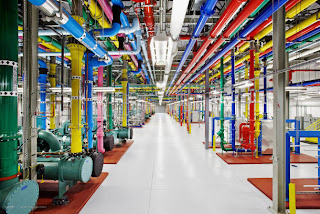As part of an effort to build appreciation for how it actually runs
online services like search, Google is showing off its massive computing
resources.
Google only rarely gives outsiders a look at its data centers, but today
it's trying to make up for lost time with a large online photo gallery
and Street View tour of the computing hardware.
The company launched a new site, "Where the Internet Lives"
with a lot of eye candy for people who enjoy racks of computer gear,
raised-floor ventilation systems, multicolored cables, and massive
air-conditioning chillers. Urs Hoelzle, Google's senior vice president
for technical infrastructure, announced the site in a blog post today.
It's short on details for those who want to eye Google's servers up close, but there are some glimpses in the accompanying video about Google's data centers and in a view from last year.
But to a certain extent, Google's individual servers are beside the
point. They may be a fundamental computing unit to ordinary people, but
Google thinks at much larger scale. Several jewels in the company's
software crown -- MapReduce, the Google File System, and Spanner,
for example -- are designed specifically to run on massive clusters of
machines and to keep on running even when individual servers fail.
Superficially, Google's custom-built servers look similar to the one
unveiled in 2009, though: computing components bolted or strapped to an
open-topped piece of sheet metal. Steve Jobs might have cared about the
aesthetics of his computers' innards, but for Google, the highest
calling is the most purely economical and functional object.
Showing off the data center is smart move for a couple reasons.
First, it could help outsiders value an operation at Google that's under
increasing scrutiny for consuming tremendous electrical power in an era
when enlightened companies are supposed to minimize their impact on the
environment. Second, it could trigger some ooh-aahs among people who've
begun to take Google's truly impressive computing achievements for
granted.
It's something Google can genuinely brag about. The company gets grief
for alleged privacy invasions and monopoly abuse, but the company has
earned respect when it comes to running a colossal computing operation.
Not for nothing do people joke that Skynet is most likely to become conscious within Google's infrastructure.
Article via c|net


No comments:
Post a Comment